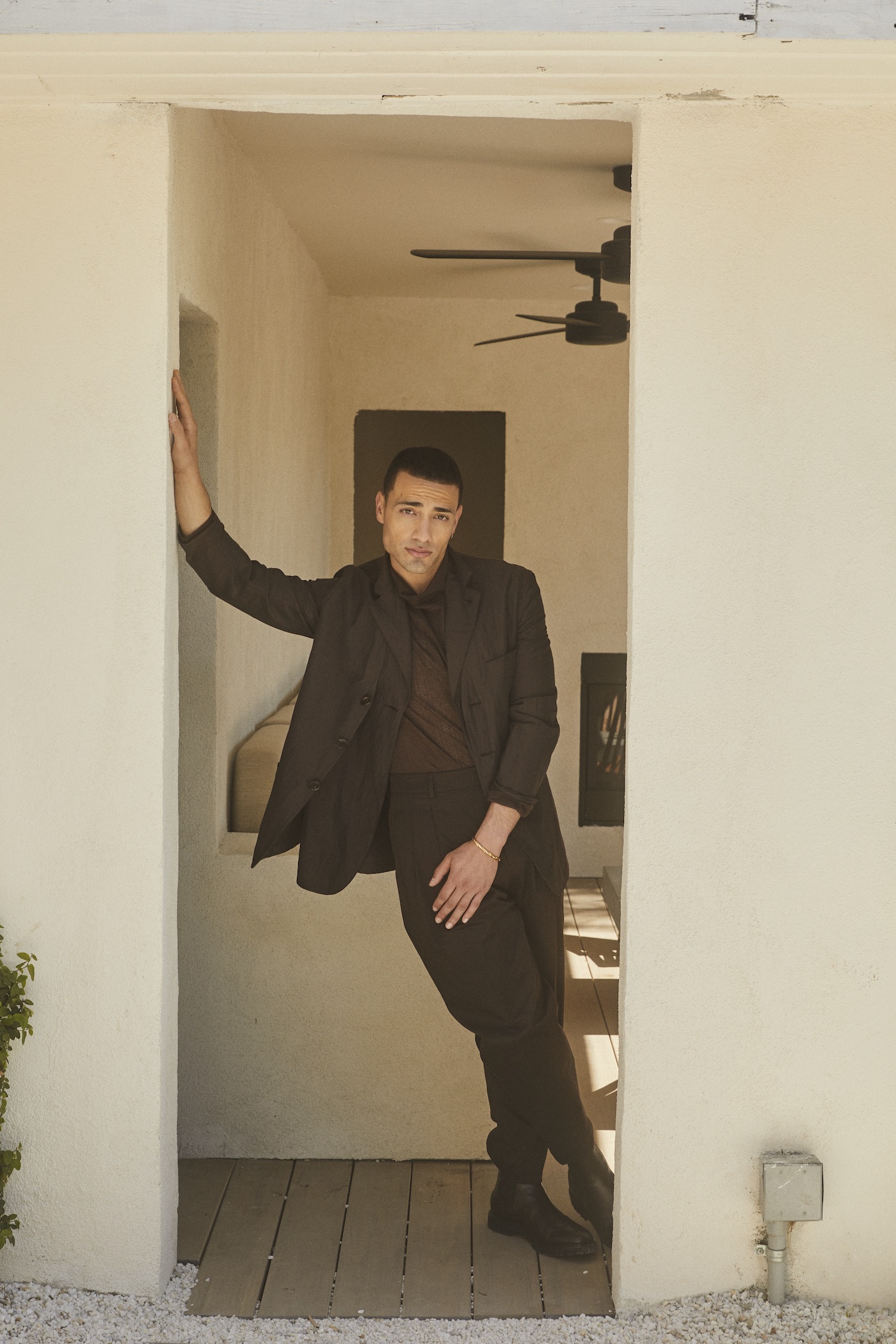Freddy Miyares Loves The Process
The DMZ star talks Latino representation in Hollywood, his appreciation for filmmaking, and creative processes on set.

The day after our conversation, I received an email from Freddy Miyares with a short paragraph introducing his need to clarify a position that he was passionate about existing within a gray area in Hollywood. Feeling as if he did not articulate himself clearly, my first thought was to reply with an objection to how I viewed the passionate conversation that we were caught up in just an afternoon before. Confident and relaxed, there is no denying that he was prepared for the undertaking that professional acting may throw at him, and he is entirely aware and excited to walk along such a path.
Bright and buoyant, it’s hard to miss the 27-year-old actor as he made his big break in When They See Us and an appearance in The L Word: Generation Q. Miyares’s most recent role compromises him as a lead in HBO’s DMZ, starring as Skel, an assassin for one of the many gangs who live within the demilitarized zone (the neutral region between the two territories of the United States and the Free States of America) that encompasses the whole of Manhattan. Costarring alongside Rosario Dawson and Benjamin Bratt, the limited series was first piloted in 2020 before being pushed back due to the pandemic and launched as a four-part entry for HBO. Unlike the hardened exterior of his character, Miyares was all smiles with an expressive charisma, where at times, our call would turn into an interviewee-questions-interviewer. But that may say a lot about how Freddy Miyares seems to process his life, seeing it as a collaborative effort that can end in a beautiful result.

Born in Miami to a Honduran-Cuban household, he experienced a culture shock when moving from his native city to Pittsburgh to attend Carnegie Mellon University for its drama program. “I got there, and I’d be greeting people with kisses on the cheek, and people would be like backing up, you know? And that was something I was so accustomed to growing up in a Latin family, but also in a predominantly Latin community, in Miami,” said Miyares. “There are certain tendencies that people function under that just wasn’t the norm for the rest of the United States. And so I had a bit of a culture shock traveling outside of the little bubble that is Miami.”
While Carnegie Mellon forged a deeper depth of understanding for the theater, he had an itch that did not seem to go away as he tried to figure out what would be beyond college, becoming entranced with outside of the stage because “there was something about film and TV that was mysterious.” Curiosity heightened as he learned how to work behind the camera, cementing his intention to work beyond the stage and have a better relationship with being on screen.
He did not have to hold out for long. Soon after graduating in 2017, Miyares was cast as adult Raymond Santana, one of the wrongly prosecuted teenagers of the Central Park Five, for Netflix’s critically acclaimed series When They See Us. The four-part drama introduced him to filmmaker Ava DuVernay, who would later become one of the showrunners for DMZ. Built upon a dystopian setting, the show highlights a sense of hope amid the depression of being caught in the middle of a power-hungry conflict on a personal and political level, leading to a need for character building. This workshop-like collaborative effort allowed tweaks on the go “Most of my other jobs leading up to this one, you take the texts, you analyze it, and you interpret it. And then you go to the set, and you do your thing. [But for DMZ], we’re building a world and the characters from the ground up and back in 2020.”

While DuVernay directed the pilot episode, cinematographer Ernest Dickinson took over for the other three installments of the series, appealing to what I saw as Miyare’s appreciation for the different segments behind the craft of filmmaking, as he was “still a student of the craft” he would note later in our conversation.
Answering a question about the different directing processes between the two showrunners, he began to gush as he started with DuVernay, “Ava, as far as directing goes, lets you just run the scene and figure out how you’ve naturally existed in that space.” Dickerson dispensed a different philosophy for the actor, “He has these images painted out. He will suggest the direction and then work the cameras that way, but he doesn’t say much. He trusts that the actors know their shit.”
Miyares seems to want to know his shit, too, as the curiosity manifested during his college years has not slowed down. His experiences with his last couple of projects conjured a pursuit to showcase new stories, especially those that highlight diverse identities. “I believe that I have more to offer [in front of ]the camera. I also realize that so many stories are just being muted,” he said, “I have stories that I want to elaborate and expand upon.”
He expanded upon this idea further in the email that I noted earlier, hinting that while Hollywood seems to be the most open to diverse “change,” they are still a few steps behind divulging into different identities. As a lighter-skinned Latino man, Miyares described a conflict with the fluidity of the spectrum that is easily filtered in Hollywood, but that does not halt him from making that goal.
“It is a perspective that can change the way we see each other and coexist as people, yet Hollywood has yet to pick up on it. As a result, my racial ambiguity works against me because the powers don’t yet know what box to put me in,” he wrote. “ I want the box I stand on to be exactly what I am; a man existing within the spectrum, not outcast but not entirely welcomed––an immigrant to Hollywood. I want to lay the foundation on land that hasn’t occupied many like me, telling stories from an angle not yet covered.”

Miyares plans to continue staying in front of the camera, as he is still learning as an actor in his pursuit of knowledge. But the future is not holding back for the actor as he pursues to make great bounds in interacting with different stories, hoisting new pillars of achievements with each new project.
This determination is why I had to ask what the sign of his horoscope was by the end of our conversation, originating from a tickling that began when he described his need to learn about being behind the camera. Dancing around the answer, he eventually confessed that he was a Scorpio. Even while there were moans and sighs, it all seems to make sense, significantly if you believe in astrology as a defining trait for the star sign. Therefore, there was no need to pry further to be confident that Freddy Miyares may have no difficulty handling what’s to come next.
Discover More
